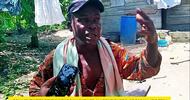CUNY Academic Commons | 18 October 2024
Video: TIAA exposed: Pesticides and land grabs harming black communities and the climate
Speakers: Members of TIAA Exposed from Phillips County Arkansas
Introduction: Doug Hertzler, Stop Land Grabs Campaign, ActionAid USA
Moderator: Abigayle Reese, TIAA-Divest
TIAA is the world’s largest landgrabber, having acquired over 3 million acres of land in a little over a decade, often in places impacted by land-related violence, such as Brazil, Colombia, and in the United States, Phillips County Arkansas.
TIAA is also a climate-destructive investor; it is the global leader in using retirement money to speculate in land grabbing for industrial agriculture, the second largest cause of greenhouse gas emissions, pollution of the environment, and the economic destruction of rural communities. TIAA also holds $78 billion in fossil fuels
Phillips County Arkansas was the site of the Elaine race massacre of 1919, when Black landowners and sharecroppers were driven off of their land and it is estimated that hundreds were murdered by forces mustered by local white elites.
For the last hundred years, a slow massacre has continued through racism and violence, forcing more Black community members off their land, eliminating jobs and livelihoods, causing food insecurity, closing local businesses and schools, poisoning of the air and water with pesticides, resulting in displacement, poor health, and lowered life expectancy.
TIAA has become a key actor profiting from this history and perpetuating the slow massacre by buying an area larger that the city of Washington DC that surrounds the town of Elaine Arkansas. It leases the land to a corporate cotton and soy farm operator who uses high amounts of fossil fuels and climate-harming fertilizers, depletes the water table, ignores soil erosion, burns crop residue and pesticide containers, and sprays pesticides that drift into yards and gardens.
Black communities are calling for an end to pesticide spraying in their air and water, reparations, and land return from TIAA to address the profiteering from the history of violence and extraction of natural resources taken from local communities. They call upon TIAA clients at universities to express their solidarity and work to eliminate social injustice and environmental harm from their retirement portfolios.












